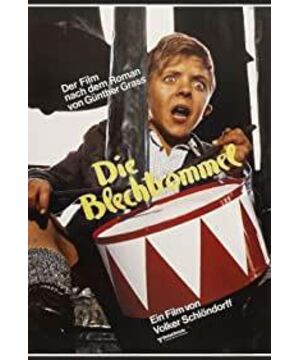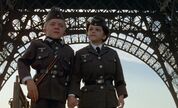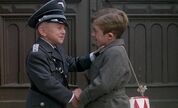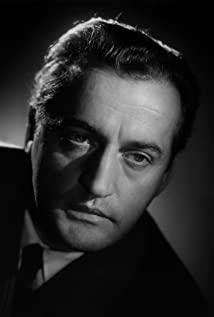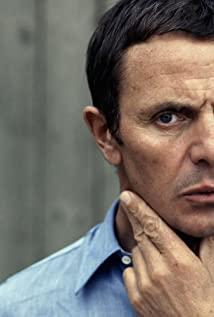film starts out with the rhythm of the tin drum with not dull drums. The joy of the drums is mixed with a bit of absurdity. Introduces the beginning of the story. This film is not like the complex and chaotic personal narrative of the original book. I often need to jump between the lines repeatedly, just to find some clues that seem irrelevant to sort out the thoughts in my brain, so as to find a reasonable and natural explanation. . The original book starts with [The Fat Skirt], and this film is no exception. The jumping language and unpredictable narration of the original book seem to come from Oscar's mouth receiving psychiatric treatment on the hospital bed. A subcultural atmosphere of morbid logic and abnormal ethics is fully displayed in front of us, while the film is relatively plain. The tone of the narrative is tepid, and the language of the shots is simple and natural. Perhaps it is this simplicity and nature that makes the film lose the pungent, obscure, and strong allegorical connotations of the original, weakening and diluting the dramatic conflict, and making the incompatibility between the characters and social life obviously dimmed.
This weakening and bleakness is not only reflected in the characters and narrative techniques. The film also blurs the historical background. For example, the novel tells the troubled history of Danzig. The novel tells the story of Niobe. Niobe is a wooden sculpture of the bow of a ship modeled after a naked witch. Its miraculous history shows that whoever gets its hands on it will doom. The author obviously compares Danzig with this wood carving, and condenses the changes of the times into the left and right swings of political positions. Many background descriptions such as this in the novel hide the author's political inclination, and use absurd touches to refer to sensitive political issues in every small story. However, the film has hurriedly introduced the background of the city of Danzig. A few simple shots and a few simple narrations clearly reflect the director's attitude of weakening the political meaning, and fully reflect the German cultural thinking 25 years after World War II. Calm on the sidelines and limited reflection. This kind of onlooker and reflection is not mixed with blind patriotism, and it also fully eliminates the extreme and stubbornness of the imprisoned culture. Such a view is more broad, calm, and objective.
My room is windless/Religious/A cigarette/So mysterious/Who dares to raise the rent or ask about my wife
This is an excerpt from the original author Günter Glass's poetry collection [The Merit of Hyacinth Flags], from which we can also feel the author's personal experience of hardships and his inner anguish and helplessness. Of course, it is the author's own life experience that has created the outstanding literary and artistic achievements of the original work. Of course, it has also left a heavy imprint on the novel. It is more devoted to the author's own attitudes and views on the characters, rather than the original work. Historical reflection is rather the author's sympathy and pity for the tragic fate of historical and social figures. From this point of view, its meaning is quite similar to Mr. Lu Xun's "angry for Xianglin's wife, and mourning for her misfortune".
Since the birth of Oscar, the film has presented his innate rebelliousness to the audience. This rebelliousness is a kind of avoidance and world-weariness. From a deeper level, it reflects the loneliness and anxiety in the characters' hearts, and also shows that the turbulent era is not long before. will come and the great trauma the war will inflict on the characters' hearts. The director used Oscar's subjective perspective to describe the scene of him crawling out of his mother's womb. The inverted perspective, the oncoming 60-watt light bulb and the unfamiliar faces of the two men made little Oscar want to go back to his mother's womb again, because he felt the world It was so unfamiliar and so different from what he had imagined, that it wasn't until his mother said that she gave him a tin drum when he was three years old that it aroused a little desire to live in this world. However, the ambiguous relationship between his uncle and his mother made him hate the world again, and he preferred to live in a carefree childhood, so he chose to self-mutilate, fell into the cellar, and never grew taller. It was because of the existence of the tin drum that he was willing to stay in this world, and it was precisely because of this that when his father wanted to take the tin drum from him, he chose to resist for the first time in his life and shattered his family with screams. clock. This fierce scream pierced through the whole town, and the sound waves from the human vocal cords had never been so fierce. Faithful to the original novel, the surrealism given to the characters by the film adds fantasy to the film, but in fact growth, screaming and other fictional magical stories are intertwined with real life in different specific environments. true description.
Oscar lives in the world of the little townspeople of La Bess Road in the German-populated Longfur district of Danzig. The first description of the Nazis in the film is accompanied by the second scream of the little Oscar. His screams that are enough to make the street lights tremble make the appearance of the Nazis seem so discordant, the smart little Oscar. Passing swaggeringly in front of the Nazi team, several Nazi soldiers beating gongs and drums looked clumsy and ridiculous in front of little Oscar and his little tin drum. Such a few short shots vividly outline the background of the whole town and vividly reproduce the narrative method of the novel.
Little Oscar and his little tin drum are always inseparable, the only drum that makes him still nostalgic for the whole world has become one with him in a sense. Acting as a life-bearer, it communicates with him in an elusive way. Many times, the sound of drums is another form of little Oscar's scream, another form of shouting, and its sound and rhythm often condense Oscar's emotions, happiness, innocence, sadness, and fear. Oscar's first lesson will be unforgettable for the teacher. His drum beats and screams deeply sting the teacher's fragile nerves. This unrestrained emotional outlet will also spread this tingling feeling to the world. on the audience. Two of the many objects "attacked" by Oscar's screams in the film caught our attention. One was the teacher who symbolized the "assimilation symbol" (to be precise, the teacher's glasses), which I just mentioned. One is the specimen bottle that symbolizes the "imprisonment symbol" doctor. The shattered specimen fragments and the rudimentary form of the infant wrapped in the cross-flowing formalin liquid are clearly a kind of subconscious resistance of little Oscar. This kind of resistance to the institutional restraint is very subtle but very direct, although there is no [Xiaoshanke] The dramatic revolt at the end of "The Redemption" is hearty and incisive, not as intriguing as the return of liberalism at the end of "Flying Over the Cuckoo's Nest", but the sharp auditory expression, the figurative metaphor, and the profound irony still linger in my memory.
Oscar does not exclude his uncle, because when he and his mother moved to the early days of the town, they had a very good relationship, and his pleasant steps and kind expression fully demonstrated this, but the subsequent incest between his mother and his uncle was very important to the little boy. The impact of Oscar's moral concept is unimaginable. When a young child spy on all this, his character has become not so simple. His eyes are deeper and deeper, and he uses the top floor of the building to scream. The sound ripped apart the balance of the world, and the shards of glass that slid down like blood from a child's heart made the last moan in the empty and distant sky.
Oscar is full of fear of human beings. He witnessed all kinds of unimaginable things happening in this world, until one day he met the same deformed man Bebra in the circus. This is the first time the film clearly depicts him and the outside world. The scene of world communication, this scene is very short, Oscar's eyes eager to communicate, the brisk drum beat and the scream to show his special talent all made his closed heart open to the audience and the world for the first time. If the tin drum as a synonym for faith, conscience, morality and justice lured his birth, then Bebra, as a synonym for friend, brother, kindness and sincerity, relieved his long-suppressed loneliness and desolation. This unexpected encounter is a brighter point in the film. Bebra's persuasive language is like a ray of clear spring that nourishes Oscar's dim inner world, and also lays the groundwork for the outbreak of war.
Oscar's father is obviously a representative of a typical pro-Nazi German. The head of Beethoven hanging above the piano has been replaced with that of Hitler, indicating the change of historical background. The bright Nazi armbands on his father's arms and the hysterical Nazis that frequently appear on the radio Speeches and parties in the plaza where the languid people were inexplicably disturbed by the sound of Oscar drums all used the behavior of characters to mirror the current state of the town amid social unrest. Contrary to his father's German identity, his uncle was Polish, and he clearly knew the role Poland played in such an environment. Compared with his father's fierceness, his anti-war sentiment was much more restrained, which was in contrast to Poland's weakness in World War II. Political stance and military capability are relevant. Wandering between two men and two incompatible positions, little Oscar's inner depression was thrown out of control because of the outbreak of the war, and since then the development of the film and the novel has fallen into a gloomy and dark tone, even if it is occasionally A few strands of bright colors were also shrouded in death, and death followed one after another, just like the bloody eel head chopped under the father's saber, cruel and absurd.
Mother Anne also lived between two irreconcilable men, living in an environment of extreme terror. The powerful violence of her husband and the insatiable desire of her cousin represent Germany's colonization and rape and Poland's cowardice and vanity respectively, and the sharp conflicts between these two sides are fiercely fighting in the weak female body, she is pessimistic about her own destiny It is suffering and suffering. Helplessly, she used prayer to sober up her tired body and soul. She thought she was sinful and prayed for God's forgiveness on Easter Day. Maybe what she was looking for was not forgiveness, but suffering, like Jesus being nailed to the ground. Accept God's punishment on the cross. "Every organ in her body stores a painful and clear memory of that Good Friday excursion, and out of fear of revisiting the old places, her organs have agreed with my mother to let her die." The text in the novel reveals the apparent reason for Annie's desperate efforts to eat fish, and also informs readers from another angle that Annie's mental breakdown is not due to the crucifix's recipe, but the unpleasant excursion. (There are only a few scenes in the excursion film, but it is vivid and eye-catching, and it is still one of the scenes that has left the deepest impression on me in the film.) The rancid horse neck fished out of the river and Annie's evil I still haven't fully understood the meaning expressed by eating eel in a style, but at least from the point of view of the image, Anne's depressed mental state was not caused by the outbreak of the war. Her anxiety about life was that she could not choose stability. The main reasons for her family and her inability to break free from the bondage of the two men are also the root causes of her insanity in the second half of her life. The film has a dialogue between her grandmother and Annie. Annie, who lacked fatherly love since childhood, was terrified because of the unknown future of the baby in her arms. She didn't want the child to be born and still didn't know who her father was. She didn't want her child. Repeating my own mistakes, from this point of view, Anne's death is the inevitable result of the tragic ending of the female characters, and it is an inevitable law that cannot be avoided. Women have always played a ravaged and trampled role in historical events, and the film (and of course the original) also spread the tragic color throughout the film (and novel) from the perspective of women's tragedy.
Marcus, the toy dealer, was Jewish, and his Jewish identity was first confirmed at Anne's funeral. Marcus used the religious term "baptism" skillfully on himself, and he clearly understood himself fate is uncertain. And the last time he was seen was when the Jew died in his toy store in a monologue recited by little Oscar. Marcus's identity can be said to be very sensitive. He is the provider of Oscar's tin drum and also has an inexplicable ambiguous relationship with Oscar's mother. When he was dying, Oscar once had such a monologue, "There used to be A toy dealer, his name is Marcus, he took all the toys in the world with him when he left..."
Uncle Yang's death was expected, and the sense of fate permeated the entire film, which is different from the novel. Large-scale religious narratives are relevant. In this battle of the Polish Post Office, we clearly saw the tragic fate of the Poles. The fast-flying bullets bloomed bright colors on the flesh and blood, and the down-and-out people were filled with the smoke of the war. The god of death continued to care for them suffering people. Destiny, a chess piece we can't control, flies lightly between death and survival. Yang's death is not as direct as the deaths of other Poles, the film does not give us a clear image, but uses the "Q of Hearts" in Yang's hand when he was arrested to hint at his own fate, and also hint at Oscar's The fate of father Alfred. Uncle and father are two characters around mother. The relationship between the three is just like J, Q, and K in poker. J has a weak face and a cowardly inner world. His love for Q is based on ethics and authority. Under the double oppression of the forces, it tends to be dull, and his complacency is the special behavior of a special person in a special era. However, his inner hot feelings have nowhere to vent, and cheating has become the doomed theme in his life. In this way, he avoided the eyes of the world and blinded the eyes of his husband Affleck, but he couldn't escape the sharp eyes of little Oscar, and made the world not so beautiful in a seemingly gentle but most sinister way, at least in the Oscar's eyes.
In the eyes of little Oscar, the only good thing is probably the arrival of Maria, he will sing a song with Maria before going to bed [Maria, my worship]:
Maria/I love you/I will love you with all my heart/ Love you forever / we will never part.
The lyrics are pure expression of Oscar's first vision of love between men and women. However, singing is only the most beautiful dream, and all the innocence will pay for it. It wasn't just Oscar that attracted the attention of Maria. When Maria first came to his family, the camera was drawn from his father's electrocuted eyes to Oscar's tender torso. From the very beginning, Oscar was controlled by his father, who symbolized the power of fascism. His subordinate position in the family and his deformed and weak body made this love doomed from the beginning. Maria is not a pure girl. She will abuse Oscar with "weird bugs". She will have 15 minutes of non-stop sex with her father to win her heart. Women's love and vanity sometimes do not appear vain. Form, the father made this falsehood a reality, and she finally became his father's wife, the wife of a father whose son was the same age as hers.
Oscar's second woman, Lostar, met at the circus. They have the same figure, and their combination is just like the attraction between him and Bebra, without the "adult" ridicule and "appreciation" , without the vanity and cunning of "adults", without the flamboyance and sinisterness of "adults", everything has become like a fairy tale, and Oscar has experienced love and being loved in the world for the first time in his life. However, the scene where the prince and princess live a happy and beautiful life can only happen in Hans Christian Andersen or Grimm's fairy tales. The reality is always cruel, hideous and unexpected. Lostar lost his life in an air raid, Oscar became the only thorn bird, and his hoarse cry cut through the sky, leaving behind the sadness of death.
Death, the inescapable destination of human beings, also cannot escape from Oscar's father. The German rout was as quick as its blitzkrieg. The Soviets came, and father Alfred burned almost all the Nazi relics, but left out a Nazi medal. His death is as absurd as ever, but it is very eye-catching. After the audience experienced the deaths of Annie, Marcus and Yang Jingjing, Alfred's death can be described as shocking. The director gave the Nazis this uneasy way. A kind of "vigorous", which also made the bad news of death sound in the film for the last time.
At the end of the film, Oscar lost the tin drum that had accompanied him for 17 years at his father's funeral and plunged into his father's tomb. God also gave him a miracle of growing up. Regain the power of growth. A train is loaded with hope or is lost to an unknown distance, the grandmother is left alone, and returned to the desolate land to bake potatoes, the aroma is everywhere...
Different from the dark tone at the end of the novel and the desolation of tragedy , The film [Tin Drum] rhythmically shows the human world in a special era with an abnormal pace, its description of justice and injustice is obscure, and its influence on people's value choices has a gratifying calmness. Although the story starts from Oscar, a child who is only one foot three, it is such an inconspicuous child that makes the whole story full of intellectual beauty, growth, love, death and war all show a moving magnificence in front of the audience , in the bottom of people's hearts accumulated a touching splendor. If the life in [Forrest Gump] is a psychedelic color map of a colorful world under fantasy colors, salty, bitter and sweet as chocolate, then the life in [Tin Drum] is a kind of eccentric thinking in the real world. , which uses the timeless lens language to compile an aria of life for us, allowing the value of life to run through the entire film.
04 "Film World"
04/07/17
View more about The Tin Drum reviews


